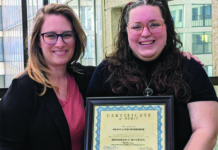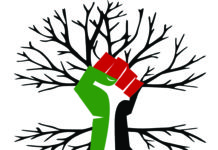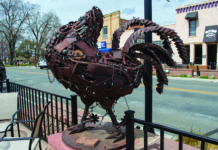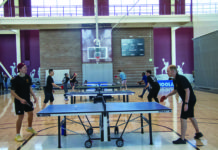Student athletes that play under the National Collegiate Athletic Association (NCAA) sports are assigned an athletic trainer. At Colorado Mesa University there are five full-time athletic trainers, an intern and a full-time club sports trainer. Along with hired personnel, there are student trainers that are a part of the accredited athletic training program. Joshua Fullmer, head of the athletic trainers, explained the requirements for the NCAA sports.
“They all have to go through multiple pages of paperwork, physicals, proof of insurance and all these different types of NCAA paperwork for compliance purposes to be able to be cleared to participate in their sport,” Fullmer said.
There are also certain pieces of documentation that have to be in order prior for the athletic trainers to treat them.

“NCAA athletes have a certain standard or set of paperwork that they have to complete before being able to participate,” Fullmer said. “Club side is a little bit different. Some of the sports require physicals and some of them don’t.”
Only the NCAA student-athletes have access to these five trainers. Club and some intramural sports will have access to the club athletic trainer. Otherwise, students can only receive care from the student health clinic.
This is due to the law and guidelines that the trainers have to follow.
“There are medical guidelines we have to follow, we work as athletic trainers in the state of Colorado due to our state practice act we work under the direction of a physician,” Fullmer said. “It is clearly stated that we work with NCAA student-athletes.”
The NCAA sponsored sports are mandated to do certain things. Cheerleading and the Mavettes are one of the few sports that are a little different. They are technically not a NCAA sanctioned sport.
“Cheerleading has been back and forth,” Fullmer said. “There have been years where they didn’t really want to do all the physicals and insurance stuff, but they’ve been back with us for a few years now.”
The Mavettes split form cheerleading and went under the control of the dance department.
“They [Mavettes] chose to do their own thing,” Fullmer said.
Since they are not sponsored by the NCAA it is up to the coach’s discretion on whether or not to complete all the required tasks of the NCAA sports.
The athletic trainers are a service that is provided to the NCAA athletes with no extra fees. The office is open to those athletes in the mornings by appointment or by need and in the afternoons open to all.
“We have orthopedic surgeons come in four nights a week for different follow-ups and different injury evaluations,” Fullmer said.
The trainers are busy with different practices and sports to juggle between the five of them. Fullmer explained that they have all been working seven day weeks since the beginning of August. They all balance teaching duties and their sports. The trainers split the sports into primary and secondary sports.
“Primary sports are the ones that my staff will travel to each game with and they’re at practice every day,” Fullmer said. “Secondary are lower risk sports.”
Every secondary sport has an assigned trainer. Fullmer is the men’s and women’s golf team trainer. Although he does not travel to every meet or attend every practice he is responsible for the athletes.
Fullmer is the head of the NCAA trainers. The club sports trainer has different rules and athletics to cover.
For those not in any sport, the health clinic is the only option to receive care. For those in club and intramural sports, they only have access to the club trainer and for those in NCAA sports, they are required to have an athletic trainer and complete all documentation necessary.





